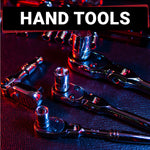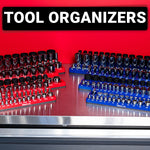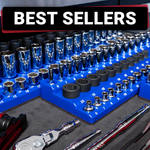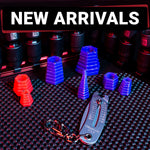Package Contents
1/2" 72-Tooth Split Beam Torque Wrench
- 1/2" drive 72-tooth flex head split beam torque wrench
- 1 hard blow molded case
- 1 calibration certificate
3/8" 72-Tooth Split Beam Torque Wrench
- 3/8" drive 72-tooth flex head split beam torque wrench
- 1 hard blow molded case
- 1 calibration certificate
1/2" 72-Tooth Rebuild Kit
- 1 1/2" faceplate
- 2 faceplate screws
- 1 1/2" 72-tooth gear
- 1 1/2" pawl
- 1 pusher spring
- 1 ball bearing
3/8" 72-Tooth Rebuild Kit
- 1 3/8" faceplate
- 2 faceplate screws
- 1 3/8" 72-tooth gear
- 1 3/8" pawl
- 1 pusher spring
- 1 ball bearing
1/2" 32-Tooth Rebuild Kit
- 1 1/2" faceplate
- 2 faceplate screws
- 1 1/2" 32-tooth gear
- 1 1/2" pawl
- 1 pusher spring
- 1 ball bearing
Specifications
- 1/2" 72-Tooth Torque Range: 50-250 ft-lb
- 3/8" 72-Tooth Torque Range: 20-100 ft-lb
- Torque Direction: Clockwise
- Accuracy: ±4%
- Flex Head: 15°
- Material: Chrome-vanadium steel (Cr-V)
- Packaging: Hard plastic blow molded case
- Country of Origin: Taiwan
- ASME Specification: B107.300-2010
- ISO Specification: ISO 6789-1:2017
- 3/8" 72-Tooth Repair Kit Part Number: 1834
- 1/2" 72-Tooth Repair Kit Part Number: 1775
- 1/2" 32-Tooth Repair Kit Part Number: 1341
What Are the Features of the Olsa Split Beam Torque Wrench?
Split beam torque wrenches deliver the accuracy and reliability that professional mechanics demand. The Olsa Tools split beam torque wrench combines accuracy with a competitive price. Here is why you will love this hand tool:
- Precision accuracy of ±4% across the complete torque range provides trustworthy measurements for every job.
- Industrial-grade chrome-vanadium steel provides sturdy construction to withstand heavy daily use and resist wear over years of service.
- The precise swing arc offers better access to fasteners in tight spaces to improve usability for professionals and DIY users alike.
- Clear click mechanism and visible beam split signal when the set torque value is reached, preventing over-torquing.
- Knob-style torque adjustment with a comfortable grip offers quick, precise setting changes without the hassle of twist-handle mechanisms.
- 1/2-inch drive size fits standard sockets for broad compatibility with common fastener sizes.
- 50–250 ft-lb torque range covers most automotive and mechanical applications.
- Field-tested by professional mechanics in Nisku, Alberta under real workshop conditions.
- A lifetime warranty backs the quality and durability of every unit.
- A completely risk-free 90-day trial period lets you test the torque wrench in your shop with a full refund guarantee.
This flex head torque wrench combines professional-grade accuracy with rugged construction at a price point that delivers exceptional value for professional mechanics and serious DIY users. Check out our torque wrenches collection if you want to choose from a variety of torque wrenches we have available.
How Should I Use a Torque Wrench?
A professional-grade torque wrench maintains proper fastener tension and prevents component damage. Follow these steps for excellent operation of your torque wrench:
- Start bolts/nuts by hand to prevent cross-threading.
- Look up the correct torque specs in your service manual.
- Set the torque value on your wrench according to the manufacturer's instructions.
- Position the wrench square and straight on the fastener.
- Apply steady pressure until you feel/hear the click or break.
- Stop immediately when the wrench signals; do not go past this point.
- Always store your wrench at its lowest torque setting.
- Get your torque wrench serviced annually to maintain calibrations.
- Never use your torque wrench to loosen tight fasteners (use a breaker bar instead).
- Clean the drive and socket interface before each use.
- Keep the mechanism free of dirt and debris.
What Is the “20 Rule” for Torque Wrenches?
Torque wrenches deliver accurate readings between 20% and 100% of their maximum torque rating. This measurement range, known as the "20 Rule," can help you select the right tool for your job.
For example, 250 ft-lb torque wrenches produce accurate measurements starting at 50 ft-lb. Using these tools below their 20% threshold could produce inaccurate readings and risk damaging fasteners. Select a wrench with a lower maximum rating for projects requiring less torque.
To put this in practical terms:
- 250 ft-lb wrenches are accurate for 50–250 ft-lb jobs.
- 100 ft-lb wrenches are accurate for 20–100 ft-lb jobs.
- 50 ft-lb wrenches are accurate for 10–50 ft-lb jobs.
The most precise measurements occur in the middle and upper portions of a torque wrench's scale.
What Are the Different Torque Wrench Types?
Here are the main types of torque wrenches:
- Click torque wrench creates an audible 'click' at the preset torque.
- Beam torque wrench shows torque with a pointer across a scale. It is simple and accurate but takes practice to read.
- Dial torque wrench displays torque on a gauge face. It is easy to read but costs more.
- Electronic torque wrench shows numerical readings on an LCD screen. It offers data storage and programming but at the highest price point.
- Hydraulic torque wrench generates high torque through fluid pressure, used in industrial work, requires a power source.
- Pneumatic torque wrench uses compressed air with adjustable settings, low vibration for accurate results.
- Micrometer torque wrench controls torque by turning the handle. The micrometer wrench has a ratchet function and auto-reset.
- Interchangeable head torque wrench accepts multiple wrench heads to reduce tool count.
Do I Need To Set My Olsa Split Beam Wrench to Zero Before Storing It?
Olsa Tools split beam wrenches maintain calibration without resetting to zero after use. Spring-style torque wrenches, which adjust through handle rotation, require resetting to zero after each use to preserve accuracy. The split beam design eliminates this step and keeps the wrench calibrated for your next task.
This calibration advantage stems from fundamental mechanical differences that provide consistent accuracy across the entire torque range. Spring mechanisms stress their internal components when set at higher torques. The split beam system prevents this stress accumulation, so accuracy remains consistent without additional steps between uses.
Split Beam vs. Click Torque Wrenches
A split beam torque wrench uses a deflecting beam design to measure torque; when force is applied, the beam visibly bends until reaching the preset value.
Click-type torque wrenches, on the other hand, use an internal spring mechanism that releases with an audible click when you reach the target torque.
Wrench Comparison Table
| Feature |
Split beam wrench |
Click-type wrench |
| Accuracy over time |
Maintains calibration longer through a simpler mechanism |
Requires more frequent calibration |
| Storage |
No need to reset to zero |
Must reset to zero after use |
| Precision |
Higher precision for sensitive machinery |
Good precision for standard tasks |
| Cost |
Higher initial investment |
More economical option |
| Best for |
Professional use |
General mechanical work and DIY projects |
Both styles are precision instruments when properly maintained. Professional mechanics often choose split beam wrenches for demanding daily use, while click-type models remain popular for general mechanical work. Olsa Tools offers both varieties with industrial-grade materials and lifetime warranties.
Does the Olsa 1/2-inch Drive Torque Wrench Come With a Calibration Certificate?
Yes, each Olsa Tools torque wrench undergoes factory testing and calibration before shipping and it does include a calibration certificate.
How Does a Split Beam Torque Wrench Compare To Other Types?
Split beam torque wrenches differ from click-type and beam-style wrenches. They use an internal beam that flexes independently from the tool's outer housing to measure torque, while click-type wrenches use internal springs and beam-style wrenches use a simple pointer.
Split beam wrenches are generally more accurate and durable. They maintain calibration longer than click-type wrenches since they don't rely on springs that can wear out. They're also more precise than basic beam-style wrenches and easier to read in tight spaces.
Split beam wrenches typically cost more than click-type and beam-style alternatives. They're also usually heavier and bulkier than click-type wrenches. While they don't require recalibration as often as click-type wrenches, they still need periodic calibration to maintain accuracy, unlike simpler beam-style wrenches that rarely need adjustment unless damaged.
Do I Need a Digital Torque Wrench?
No. Our mechanical torque wrenches offer proven reliability without the complexity of digital torque wrenches. Our tools don't need batteries to deliver accuracy in hard-to-reach spaces. A digital torque adapter adds cost and complication when simple mechanical precision is all you need.
How Should I Store My Tools?
Professional mechanics protect their valuable tools and save time with smart storage and organization. Olsa offers many different tool organizers built for torque wrenches and accessories to protect your investment between uses.
Does Olsa Offer Electric Torque Wrenches?
No. Olsa Tools doesn’t offer electric torque wrenches. At the moment, we manufacture two mechanical torque wrench models: a click type and a split beam type. Both provide precise measurements through factory-calibrated mechanical systems that never need batteries.
Can I Use Socket Adaptors With Torque Wrenches?
Yes, socket adapters fit torque wrenches. Your adapter should match your wrench's torque rating. Olsa Tool’s socket adapters fit our torque wrenches so you can always use the socket you need.
What Kinds of Sockets Are Compatible With Torque Wrenches?
Standard chrome sockets and impact sockets both fit torque wrenches. Standard chrome sockets excel at precision torque applications such as lug nuts, cylinder heads, and engine components. Though impact sockets also fit torque wrenches, their extra bulk serves no practical purpose in torque applications because torque wrenches do not generate impact force.
The thicker walls of impact sockets often limit access in confined spaces where precise torque readings matter most. For most automotive torque specifications, standard chrome sockets offer strength, precision, and accessibility.
What Other Torque Products Does Olsa Offer?
Olsa Tools offers torque screwdrivers with hex heads. These torque tools deliver precision torquing for smaller fasteners while standing up to heavy-duty tasks in automotive, industrial, and mechanical applications.



























